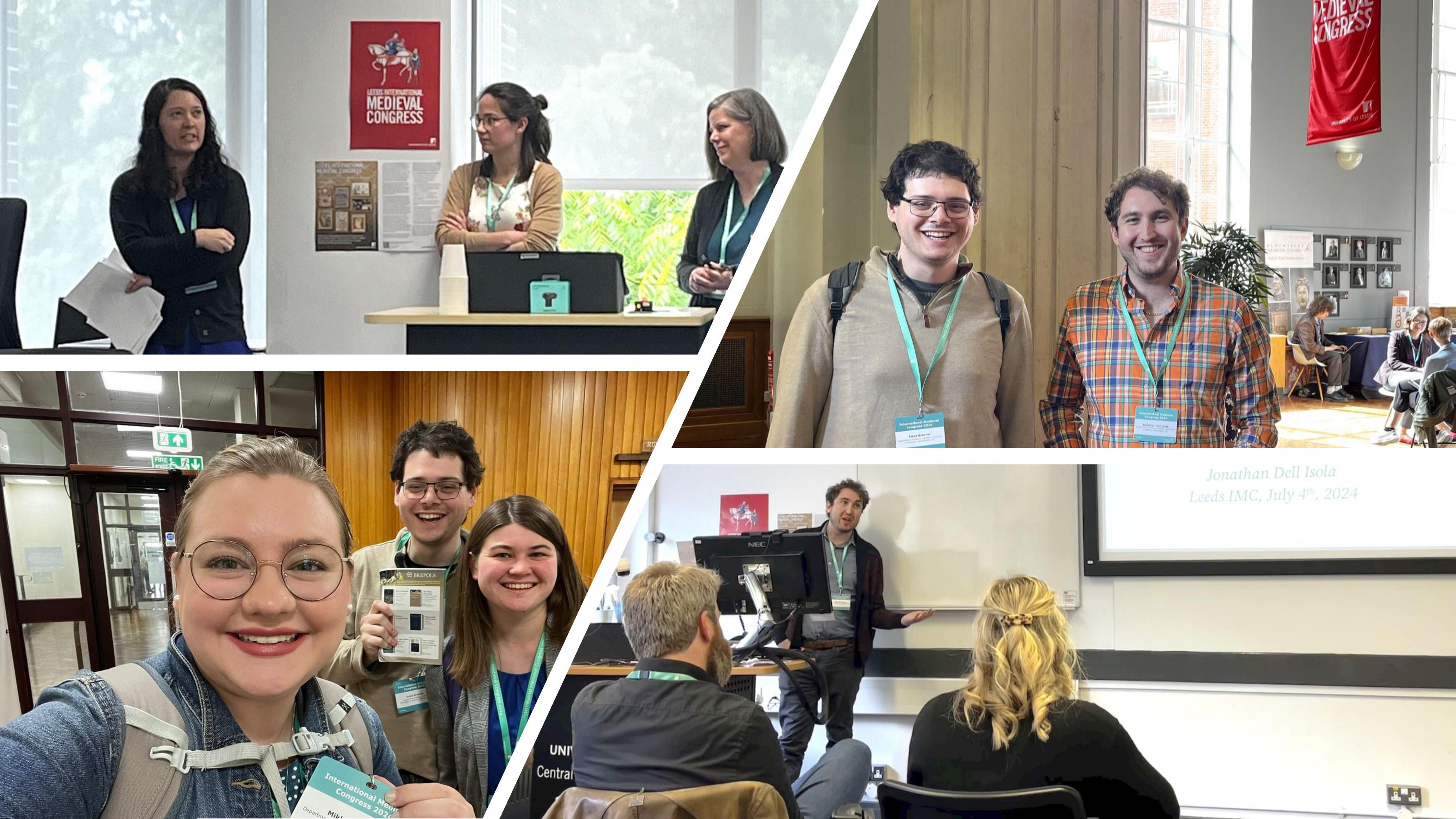
Since its inaugural meeting in 1994, the International Medieval Congress (IMC), convened annually at Leeds in northern England, has become one of the most important global venues (and Europe’s largest) for presenting research and scholarship across all aspects of the Middle Ages. IMC’s 2024 meeting (held 1-4 July) drew more than 2,300 in-person attendees from more than 60 countries (and boasted a conference program nearly 500 pages long).
Catholic University’s Department of History contributed a remarkable contingent of scholars to Leeds this year: no fewer than eight current or recent graduate students of the Department gave presentations at the conference. They were: Carol Anderson (Ph.D. 2020), Mikkaela Bailey (A.B.D.), Amos Bronner (A.B.D.), Jonathan Dell Isola (A.B.D.), Marie D’Aguanno Ito (Ph.D. 2014), Jane Maschue (A.B.D.), Marirose Osborne (M.A. 2024, now a Ph.D. student at the University of Notre Dame), and Clare Whitton (M.A. 2019, now a D.Phil. student at the University of Oxford).
Their presence in numbers, and the high quality of their research and presentations, made an impression. Mikkaela recalls that “there came a point a couple days into the conference when I would be prompted to introduce myself and was met with ‘Oh, I see you’re one of the CUA people. There are a lot of you all here together.’ It was a bit like we were a D.C. delegation or something.”
Laura Smoller, professor of history at the University of Rochester and president of the Hagiography Society, notes: “I heard papers on hagiographical topics by three of the CUA contingent: Jane Maschue, Carol Anderson, and Clare Whitton. The presentations were top-notch, among the best that I heard during the entire conference, and each of them provoked a lively discussion in the Q&A sessions that followed. These are brilliant young scholars who have had superlative training in medieval studies at CUA. Congratulations to all!”
Jane reflects: “I’m grateful to have had the opportunity to share some of my ongoing research at the International Medieval Congress in Leeds. It was a delight to present my arguments about Boethius’ cult in the Middle Ages with several other scholars of hagiography, and to receive feedback from medievalists of many disciplinary backgrounds. I was excited to meet scholars studying a wide variety of topics and feel the vibrancy of the field of medieval studies today. Most of all, I was glad to be able to share the experience with many of my friends also studying the Middle Ages at Catholic University – it was great to see our CUA community of medievalists all coming together across the Atlantic at Leeds.”
Amos adds: “Being at Leeds, where so many medievalists gather, was an excellent experience. I was very pleased to have been able to present, and it was delightful to see and hear from such a strong CUA contingent.” Likewise Jon found the IMC “an incredibly rewarding experience, because it was an opportunity to meet other early medieval historians and present the research I have been working on. Often we work in very isolated ways so it was nice to come together as a community and share new ideas, approaches, and sources.”
Professor Jennifer Davis (who is directing the dissertations of Amos and Jon) comments: “Having a chance to present their research at a conference as large and prominent as Leeds is a wonderful opportunity for our graduate students, and attests to the quality of their scholarship. I have heard already from several colleagues how impressed they were with our students’ papers. I am equally pleased that our students were able to support each other, as they discussed their work in an international venue.”
And Professor Katherine Jansen (mentor to Carol, Marie, and Jane) concurs: “I attended many of the sessions in which our students participated, and I can say that they all made a bella figura for the Department. Not a few of my colleagues told me how impressed they were with their papers and performances.”
